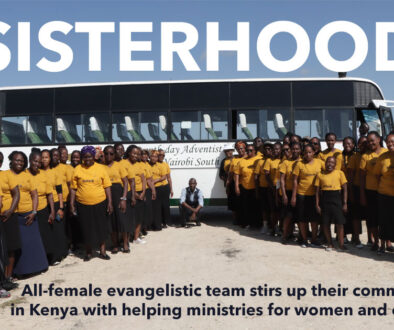Adventist Leader Addresses European Union Parliament
From ANN, October 29, 2017: What is the legacy of the Reformation for Europe in the 21st century? For Pastor Raafat Kamal, president of the Adventist denomination’s Trans-European Division (TED), it is a legacy that must not end. Together with mainly Lutheran theologians, church historians and other religious leaders, Kamal was invited to speak to the European Parliament at an event remembering the 500th Anniversary of the Protestant Reformation on October 17 at the Parliament building in Brussels, Belgium.
Organized by Members of European Parliament (MEP) Hannu Takkula, vice chair of the Parliamentary Intergroup for Freedom of Religion and Belief, the aim of the day was to explore lessons from the Reformation that can positively shape a future Europe.
From the start there was a strong emphasis on “grace,” a concept that, according to Bishop Simo Peura of the Evangelical-Lutheran Church of Finland, “opens the prophetical role of the community.” He noted Luther’s example in Wittenberg of a “common purse for the poor,” and his strong work ethic which was for the well-being of the whole community.
Dutch MEP Peter van Dalen equally focused on the importance of grace, noting that it was closely linked to “doing justice” in Psalm 37. He stated that it is “essential for us as politicians to seek justice and prevent injustice.” He emphasized that “good government will seek the well-being of our neighbor,” adding, “Gracious politics is directed to ‘the other,’ the neighbor, the environment.”
The translation of the Bible into national languages was seen as significant by several speakers. The key, according to Hungarian theologian and historian Dezsö Buzogny, was that it put the Bible on the table of every family. It also helped establish the language and so, equally, led to national identity. The emphasis on reading Scripture led to education – even for girls! This transformed Europe. He strongly stated that school, social service and mission are still the key for today.
Speakers noted that many Reformation issues are still highly significant today. “Tolerance is still a big issue,” said MEP Arne Lietz. Orthodox priest Father Heikki Huttunen observed that different Christian traditions can come together on “the relevant, not the routine.” By this he meant that different approaches from a variety of backgrounds can lead to better understanding in areas of witness, justice and hospitality. “Migration is an issue, not just for those coming into Europe, but also those moving internally,” he explained. He stressed the need for safe entry into Europe to reduce human trafficking and criminal exploitation. “The church needs to bring this discussion to the table,” he stated.
Kamal led the attentive audience back to the concept of grace, expounding on the Old Testament principle in Micah 6:8, to “do justice, love mercy, and to walk humbly with your God.” He said, “Martin Luther, with his transformed conscience, held fast to this concept, which has since inspired generations of believers and non-religious people alike. During Luther’s speech at his trial at the Diet of Worms he reinforced a message for today: ‘Unless I am convicted by scripture and plain reason, my conscience is captive to the Word of God.’”
“To embrace religious freedom is to champion and integrate the dignity of human beings in our laws, culture and way of life,” Kamal continued. “It is to adopt a personal attitude of tolerance, whereby tolerance is an expression of solidarity with every member of the human family. It translates into respect for every human being, after all, we are created in God’s image and this can only be genuine when other peoples’ rights are respected.”
However, Kamal emphasized, this goes hand-in-hand with Christian mission. He highlighted some of the mission priorities of the Adventist Church and emphasized, “Most people know that Jesus came to bring forgiveness and grace; these are hallmarks of the Reformation. Less well known is the Biblical teaching that a true experience of the grace of Jesus Christ inevitably motivates persons, communities and nations to see and apply biblical justice and mercy in this world.”
Martin Luther might have been surprised if he had found himself sitting in the parliament building for the event. Two speakers, both Catholics, spoke highly of his contribution to the development of Europe. Mairead McGuinnes, first vice president of the European Parliament, has developed a great deal of understanding and tolerance for those who think in different ways to the way she was brought up. “Even my mother,” she confessed, “thought she could talk straight to Jesus and didn’t need to go through an intermediary.” She then reiterated the same point Kamal had been stressing, “The church must keep reforming.” Even though Christianity is not so influential as it used to be in secular Europe, she emphasized that the Church plays an important part in our society.
Perhaps, not a surprise in the seat of European legislation, the final speaker was a lawyer though also a theologian. Katrin Hatzinger acknowledged Luther’s mistakes in his treatment of the Anabaptists and Sabbatarians (among others), yet through those mistakes she saw the basis of learning for current dialogue. She sees the church as a “critical counterpart” in legislative dialogue and a great provider of expertise in – for instance, areas such as handling asylum seekers and refugees. On a religious liberty note she stated that “We want differences of churches to be recognized by the EU.”
Looking back at the day, Kamal reflected that, “the unending reformation, the implication for today, based on the Word of God; I saw this today, in the presentations that were shared.”
The featured photo shows Pastor Kamal speaking. The Adventist News Network (ANN) is the official news agency of the Seventh-day Adventist denomination. This release included reporting from the TED News.




